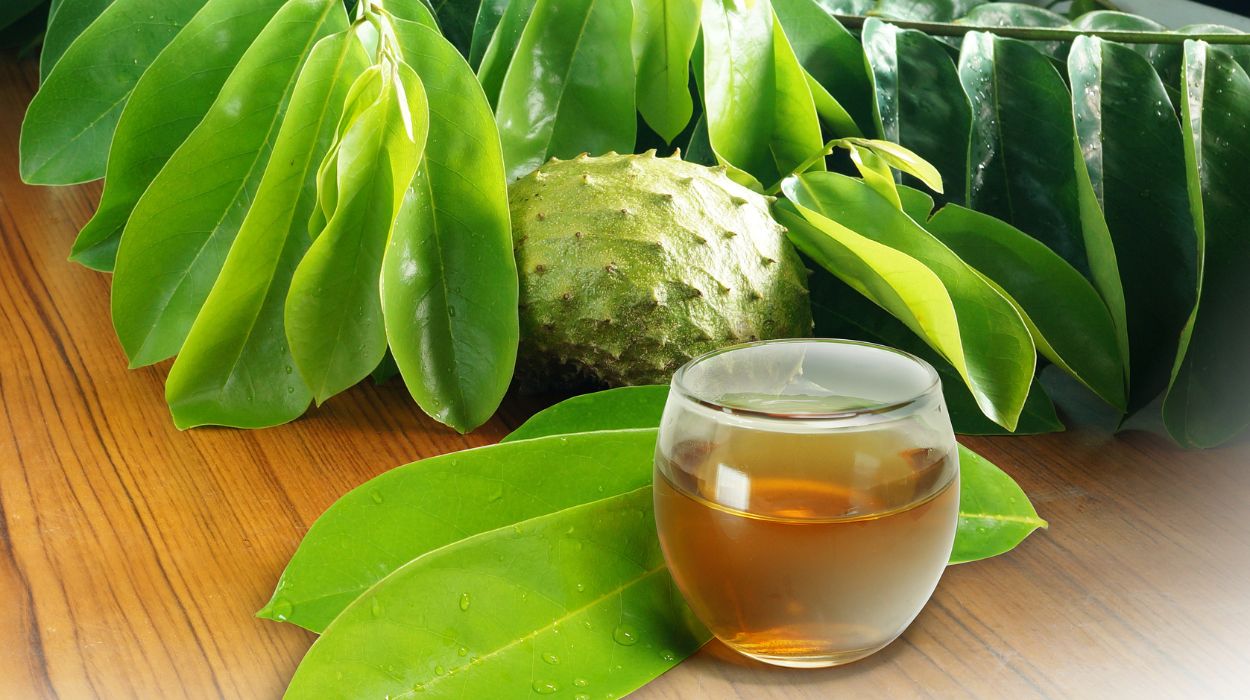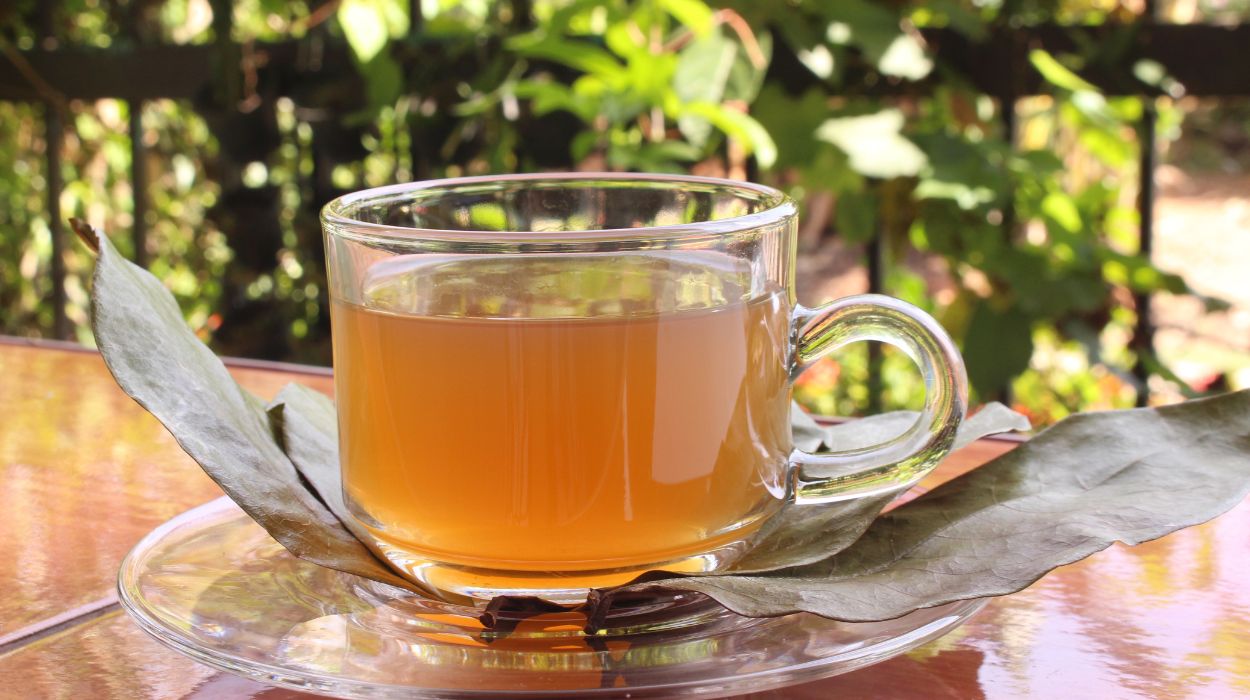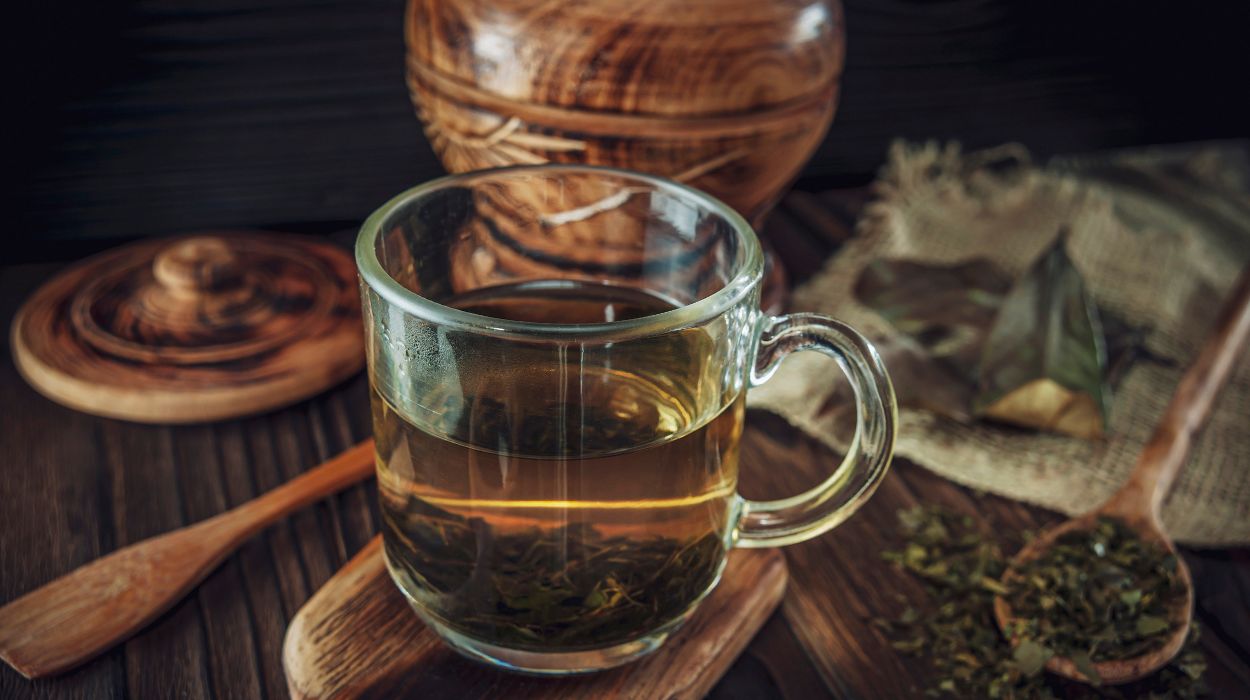Soursop tea may not sound very enticing, but its many health benefits are far from sour! Soursop, also called Annona muricata Lin or Graviola, is a medicinal plant used to treat conditions ranging from type 2 diabetes to cancer.[1] Consuming Soursop tea according to your medical practitioner’s instructions may help you heal various ailments.
This article outlines five benefits of Soursop tea and highlights some risk factors to be aware of.
What Are The Benefits Of Drinking Soursop Tea?
Soursop tea is used medicinally to treat a variety of illnesses and ailments. Soursop tea health benefits include:
- Type 2 diabetes management.
- Effective against bacterial and fungal infections.
- Effective at killing viruses.
- Used to treat ulcers and gastric lesions.
- A possible cancer treatment.
Health Benefits Of Soursop Leaf Tea

Soursop tea can help treat and manage various health conditions, due to its unique medicinal properties. Understanding the benefits of Soursop can open the door to new healing possibilities. Ask your medical practitioner if Soursop tea is suitable for your healing protocol.
Antidiabetic
The phenolic content, or a plant’s distribution of antioxidants, in Soursop fruit is robust. These high levels of antioxidants may help Soursop effectively manage type 2 diabetes[2] and reduce blood glucose levels.[1]
Many herbalists[3] use Soursop, among other traditional medicines, to treat type 2 diabetes. Ask a qualified herbalist or registered dietician about adding Soursop to your diabetes care regime.
Antibacterial And Antifungal
In studies, Soursop extracts were shown to be effective at killing harmful bacteria and fungal pathogens.[4]
In particular, Soursop is effective for S. mutans,[5] a bacteria that can lead to oral infections. Soursop is also effective against C. albicans, a candida yeast[6] that can overgrow and lead to infections in the mouth, skin, and other areas of the body.
Antiviral
In addition to its efficacy at killing harmful bacteria and yeast, Soursop may also be beneficial for killing viruses.[7] In studies, Soursop was used to treat a range of viral infections, including HPV and herpes simplex. Soursop’s effectiveness may be due to the plant leaves which can reduce oxidative stress in the body.
Gastrointestinal Damage Repair
In rodent models, Soursop leaf tea had soothing and healing effects on the gastrointestinal system.[8] More specifically, the plant leaves were shown to be safe and effective in healing gastric mucosal injury, even when administered at high doses.
Soursop leaves can be used to treat gastric lesions, such as ulcers, due to their anti-inflammatory properties; Soursop can increase the production of antioxidants and other chemicals that promote healing,[1] like glutathione, nitric oxide, and glycogen.
Anticancer
Soursop tea may be effective in treating many types of cancer. Studies show that endophytic fungo ethyl acetate extracts in Soursop leaves can kill cervical cancer cells[9] while remaining relatively harmless to normal cells.
Soursop may be effective for other types of cancers[10] including colorectal, lung, renal, pancreatic, ovarian, hepatic, and prostate cancer, among others. Soursop leaf extract may be especially beneficial in killing[11] or inhibiting the growth of breast cancer cells.
Soursop’s anticancer properties can be attributed largely to its antioxidants. These antioxidants may also help stabilize fats and oils[12] at frying temperatures, which prevents fatty acid oxidation, a risk factor for cancer.
What Is Soursop Tea?
Soursop tea is an herbal tea made from the leaves of the Soursop fruit plant.[13] Soursop trees grow primarily in tropical climates. While the fruit itself has a sweet taste, similar to pineapple or mango, the tea from the leaves is less flavorful.
Aside from its rich antioxidant profile, Soursop is nutrient-dense.[14] It contains vitamins and minerals such as calcium, magnesium, phosphorus, iron, potassium, zinc, copper, and selenium. Soursop is also high in vitamin C, which helps support[15] the immune system.
Getting Soursop tea in your diet can help diversify your tea consumption, however, do not ignore the whole fruit. Whole fruits are an important source of dietary fiber, which is essential for weight loss[16] and overall health.
If you’re consuming enough healthy food but need more nutritional support, ask a registered dietician to recommend a fruit and vegetable supplement. They may suggest supplements in the form of capsules or green powders. Discuss supplement options and learn about their unique nutritional value so you get the best green powder or supplement for you.
Who Should Drink Soursop Tea?
Healthy individuals can drink Soursop tea in moderation.
Anyone looking to lose weight may benefit from consuming Soursop tea. A study on mice indicated that Soursop leaf helps reduce body fat.[17] While these results cannot be guaranteed in humans, it’s possible that similar effects can be achieved.
You can include Soursop tea along with a weight-loss diet, which includes plenty of vegetables and fruit. To fill in any nutritional gaps, it is advantageous to discuss weight loss vitamins with a registered dietician. Consuming proper nutrients[18] can help reduce cravings, such as sugar cravings, which can support weight loss.
Soursop seeds may have a sedative[1] effect. While consuming Soursop tea may not elicit this effect, it’s possible to experience this by drinking the tea. Therefore, Soursop tea may not be suitable for children.
Additionally, pregnant women should consult their physicians before consuming Soursop tea.
Because Soursop tea can reduce blood sugar levels,[1] it is not advisable for anyone already taking antidiabetic or antihypertensive medication. The combination may cause blood sugar to drop excessively.
Soursop Tea Side Effects

Consuming large amounts of Soursop tea may induce unwanted side effects.
A study showed that Soursop may be neurotoxic,[1] potentially leading to neurodegenerative disorders. It may also contribute to nerve cell toxicity. These harmful effects were observed in doses equal to eating one Soursop fruit daily for one year.
Always weigh the Soursop tea benefits and side effects before consuming. Work with a qualified medical provider to ensure a healthy dosage — a dosage that will enhance your health, not harm it.
To be on the safe side, always obtain medical approval and supervision when consuming medicinal teas. Also, don’t rely solely on Soursop tea, since overconsumption may pose health risks. Alternate different teas that have similar antioxidant properties,[19] such as black tea and green tea.
How Much Soursop Tea Should You Drink?
Moderate amounts of Soursop tea for short periods are likely safe. However, the exact amounts to consume for efficacy and safety are not established. Additionally, the dosing may depend on any medical conditions you have and medications you may be taking.
Consult a qualified healthcare provider, such as a physician or herbalist, to establish a safe and effective amount.
When And How Often Should You Drink Soursop Tea?
Some people may want to drink Soursop tea in the morning to see how they feel throughout the day. However, if you’re drinking Soursop tea for a specific health condition, your medical practitioner may advise you differently.
For example, if you have type 2 diabetes, your practitioner may tell you to drink a cup around meals to help manage blood sugar levels. For these individuals, the health benefits of Soursop tea leaves may be greater about 15 minutes before or after a meal. For others, the timing of when they drink Soursop tea may not make a difference.
Consult your medical provider to determine the best time of day and frequency to consume Soursop tea.
Conclusion
Soursop tea is tea made from the leaves of the Soursop fruit plant. The flesh, seeds, and leaves of the plant are used for various medicinal purposes. Soursop may help treat bacterial, yeast, and fungal infections, as well as cancer, gastrointestinal lesions, and type-2 diabetes.
However, in high doses, Soursop may have serious neurological side effects. Always weigh Soursop tea benefits with the potential risks and do not consume Soursop regularly without medical oversight.
Frequently Asked Questions
The antioxidants in Soursop tea reduce inflammation, which can help manage type 2 diabetes by lowering blood glucose levels. Other plant compounds in the tea can kill viruses and bacterial infections and fight cancer.
Maybe. Some studies indicate that high amounts of Soursop over long periods may be neurotoxic. It’s best to consume Soursop tea in moderation and only as prescribed by a qualified healthcare practitioner.
Healthy individuals may prefer to drink a cup in the morning. If you’re drinking it for medicinal purposes, your practitioner should advise you on when to consume it, as well as how much and how often.
Some Soursop benefits are that it is antidiabetic, antiviral, antibacterial, and has anti-cancer properties. It may also have gastrointestinal healing effects. Many of these effects are due to Soursop’s antioxidant properties.
 Evidence Based
Evidence Based
